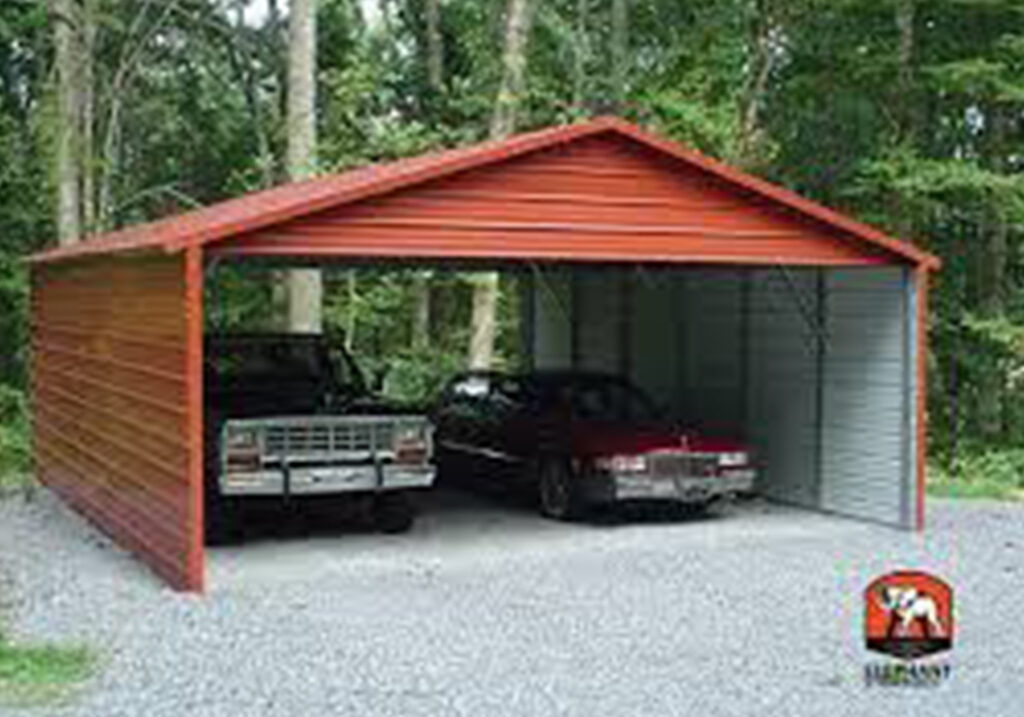Every time a homeowner plans to install a carport on his property, one question that comes to their minds is “Is buying a kit cheaper than building a carport from scratch?”
That is a valid question. Both options have their pros and cons, but cost is often the most significant consideration.
A carport can be a straightforward addition to your home, but the cost of purchasing a kit against building one from the ground up depends on a myriad of factors. This includes materials to use, labor costs, desired design, and the time it takes to build one.
Understanding the Basics: Carport Kits vs. Custom Builds
A carport kit typically includes all the necessary materials to build the structure, such as steel frames, roofing panels, and instructions on assembly. These kits are pre-designed, meaning they come with predetermined dimensions and materials that are selected to ensure ease of installation. In contrast, building a carport from scratch gives you the flexibility to choose every component of the structure, from the foundation and framing to the roofing material and style. While building from scratch may offer more design freedom, it requires more planning, sourcing of materials, and typically, professional assistance.
Material Costs: Pre-fabricated Kits vs. Custom Builds
Material costs are one of the most significant factors when deciding between purchasing a carport kit or building one from scratch. Carport kits generally come with pre-measured and pre-cut materials, which can save both time and money. Since these kits are mass-produced, manufacturers can offer the materials at a reduced cost. Materials like steel, aluminum, and galvanized steel are commonly used in carport kits and are relatively affordable compared to custom materials.
On the other hand, building a carport from scratch requires sourcing materials individually, which can drive up costs. For example, purchasing custom-cut wood or steel beams and roofing panels may end up being more expensive than buying pre-packaged kits. Additionally, if you opt for high-end materials like cedar wood or slate roofing, the price can significantly increase. However, if you already have access to affordable materials or intend to repurpose some existing materials on your property, building from scratch might become more cost-efficient.
Labor Costs: Comparing DIY vs. Professional Help
When you decide to build a carport from scratch, one of the largest costs will likely be labor. If you’re planning to hire professionals for construction, labor costs can easily exceed the price of the materials. Carport construction is a time-consuming process that requires a high level of expertise, particularly when it comes to ensuring the structure is level and secure. If you’re not confident in your DIY skills, hiring a contractor can significantly increase the cost.
In contrast, a carport kit can significantly reduce labor costs. These kits are designed for easy assembly, and many homeowners choose to tackle the installation themselves. While assembly still requires time and effort, the instructions provided with the kit make it relatively simple for even novices to complete the project. If you have some basic construction skills, you could avoid professional labor costs entirely, making a kit a far more cost-effective option. If you’re not comfortable with DIY work, some kits offer installation services for an additional fee, though this can still be cheaper than hiring a contractor for a full custom build.
Time Investment: Kit Assembly vs. Custom Construction
Time is another critical factor to consider when deciding between a pre-fabricated kit and building a carport from scratch. A DIY carport kit generally offers the quickest solution, as the materials are pre-measured and pre-cut, and the assembly instructions are clear. Many people can complete the construction of a carport kit in a weekend or a few days, depending on the complexity and size. Even if you hire someone to assemble it, the process is faster compared to building a custom structure.
Building from scratch, on the other hand, can take a significantly longer amount of time. The process involves purchasing and collecting materials, designing the structure, securing permits (if necessary), and organizing labor. While it offers the opportunity for custom features, the time commitment can be much higher. If you’re in a rush to get your carport up and running, a kit is typically the more time-efficient solution. On the other hand, if you enjoy the challenge of designing and building your own structure and have time to spare, building from scratch may be a rewarding project.
Permitting and Zoning Regulations
Whether you choose to build from scratch or use a kit, permitting and zoning regulations are important factors to consider. Many local governments require permits for any construction project, including carports. The complexity of these requirements can vary based on the size of the carport, its proximity to property lines, and your local building codes.
With a carport kit, some manufacturers provide documentation that complies with local codes, which can simplify the permitting process. However, it’s still essential to check with local authorities to ensure the kit meets all the necessary criteria. Custom-built carports may require additional planning, as you will need to ensure that the structure is compliant with local regulations, particularly if you are altering the design or using non-standard materials. It’s always advisable to check zoning laws before starting any construction project to avoid fines or having to tear down the structure after it’s built.
Customization: Flexibility with Scratch-Built vs. Kit
One of the most significant differences between a pre-fabricated kit and a custom-built carport is the level of customization. If you choose to build from scratch, you have complete freedom to design the carport according to your specific needs and preferences. You can choose the exact size, roofing material, style of framing, and any additional features such as built-in storage or workspace. This allows you to tailor the carport to match the architectural style of your home or meet any unique needs you may have, such as accommodating oversized vehicles or creating a workspace.
A carport kit, while customizable to a degree, often has more limited design options. Many kits offer a variety of sizes and roof styles, but you may not have as much flexibility when it comes to the specifics of the materials or layout. However, for those who don’t require significant customization and are happy with a standard design, a kit can be a great option. Additionally, some manufacturers offer add-ons and optional features for their kits, such as extra storage space or enclosed walls, which can give you some degree of customization without the expense of a fully custom build.
Longevity and Durability
When considering the cost of building a carport, it’s also essential to factor in the long-term durability and maintenance requirements. A well-built carport—whether purchased as a kit or constructed from scratch—should last for many years with minimal maintenance. Steel-framed carports, for instance, are highly durable and resistant to harsh weather conditions, rust, and pests. While wood-framed carports offer a more traditional look, they may require more frequent maintenance, such as painting or sealing, to keep them in good condition.
The longevity of a carport kit typically depends on the materials used. High-quality kits made of galvanized steel or aluminum tend to have a longer lifespan and require less upkeep compared to lower-quality options. Custom-built carports, particularly those made from wood, may have more aesthetic appeal but could require more regular maintenance to prevent wear and tear. When considering the initial cost of a carport, it’s essential to factor in the long-term durability and maintenance costs, as these can affect your overall investment.
Cost-Efficiency and Return on Investment (ROI)
Ultimately, whether buying a carport kit or building one from scratch is more cost-efficient depends on your goals. If you’re looking for a quick, affordable solution to shelter your vehicles, a carport kit is likely the most cost-effective option. The simplicity of assembly, reduced labor costs, and predictable pricing make it a great choice for those on a budget or with limited time.
On the other hand, if you’re interested in a more personalized structure that adds value to your property and caters to specific needs, building a carport from scratch might be worth the additional investment. The flexibility of design, coupled with the possibility of incorporating higher-end materials, makes custom-built carports a more attractive choice for those looking to create a truly unique and functional space. While it may have a higher upfront cost, a custom carport can provide more long-term satisfaction and potentially increase the value of your home.
Conclusion
In conclusion, both options provide distinct advantages as well as challenges. Your decision depends on your budget, timeline, design preferences, and the design you want.
Carport kits are usually the more affordable choice for those seeking a quick, hassle-free solution. They save on labor costs, require less time to assemble, and come with standardized materials that are often more affordable. Meanwhile, building from scratch allows for greater creativity and flexibility, but it comes with higher costs, both in terms of materials and labor.

